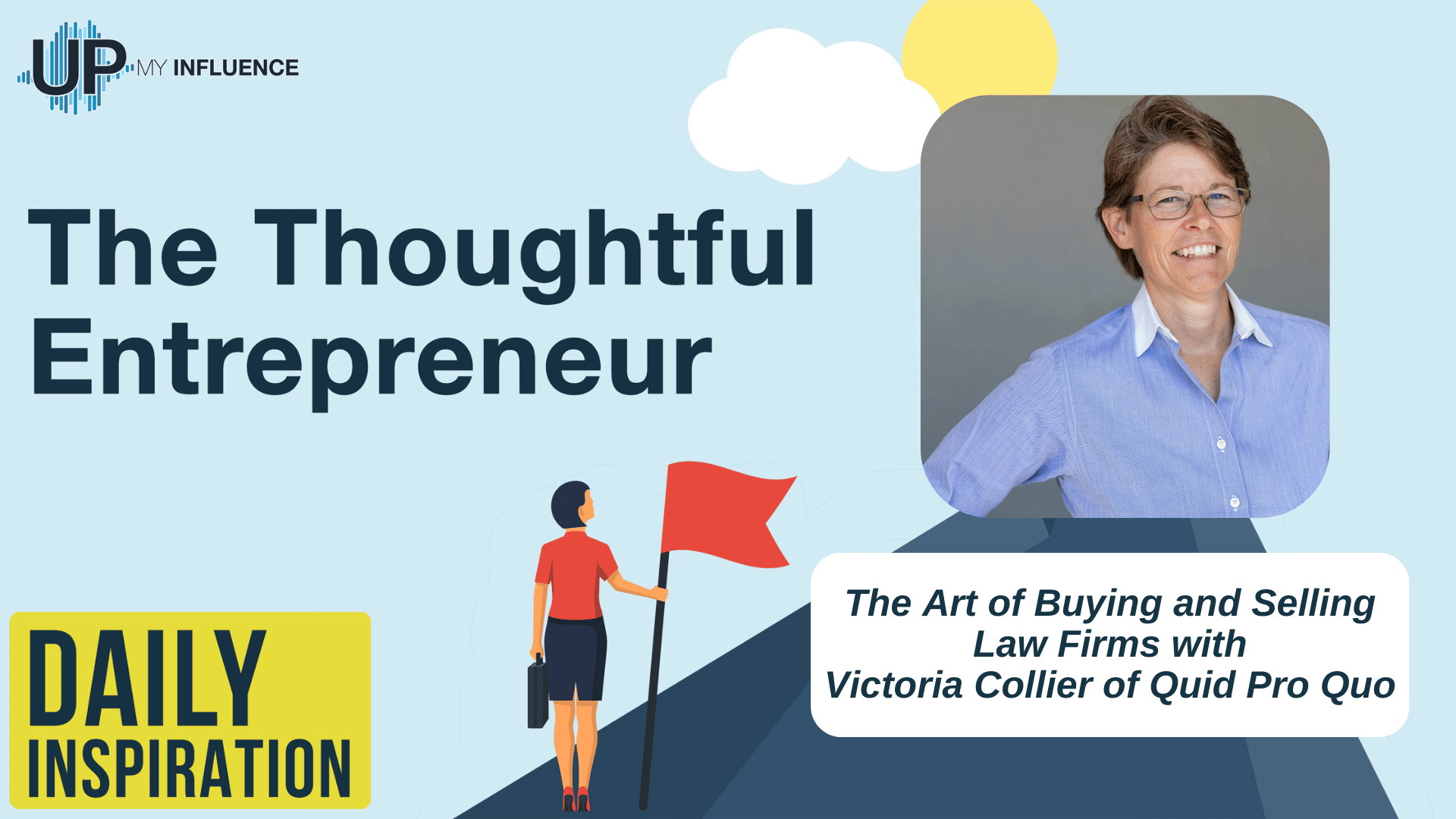THE THOUGHTFUL ENTREPRENEUR PODCAST
In this episode of the Thoughtful Entrepreneur, your host Josh Elledge speaks with the CEO & Owner of Quid Pro Quo, Victoria Collier.

Victoria Collier brings a wealth of knowledge to the table with her expertise in guiding lawyers through the sale of their practices. Her approach is about finding a buyer and ensuring that law firm owners can find their life after the law. This involves a comprehensive strategy that includes positioning the firm for sale and acting as a broker to connect with the right buyer.
One of the key topics we discussed was how small law firm owners could prepare their firms to be attractive acquisition targets. Victoria stressed the importance of shifting one's mindset from being a practitioner to embracing the role of a business owner. This shift is crucial in building assets within the firm that go beyond revenue generation.
A predictable income and robust production systems are vital in demonstrating the firm's stability and potential for growth. Operational procedures and transparent workflows add to the firm's value, showcasing a well-organized and efficient practice that a buyer could easily integrate into their existing operations.
Victoria talked through the engagement process with Quid Pro Quo Law, which begins with assessing the emotional readiness of the seller and obtaining a valuation of the business. The acquisition process involves due diligence and navigating the emotional challenges sellers may face during the transition.
Key Points from the Episode:
- Reasons for acquiring existing law firms
- Steps for making law firms attractive for acquisition
- Sales process for law firms
- Post-sale transition period for sellers
- Benefits for buyers in acquiring existing law firms
- Growth through acquisition strategy for larger law firms
- Criteria for potential acquisitions
- Shift in mindset for small law firm owners
- Importance of building assets within the firm
- Post-sale period and personalized roles for sellers
About Victoria Collier:
Victoria Collier is a multifaceted legal and business professional who transitioned seamlessly from her Air Force paralegal role to founding her own law firm. With her unique background, she specialized in Elder Law Estate Planning, distinguishing herself as a pioneer in educating elder law attorneys nationwide about Veterans Benefits for Seniors.
Her expertise extended beyond legal practice to business coaching, where she co-owned a successful company, guiding other attorneys in growing their practices
Under her leadership for 18 years, her law firm consistently generated impressive revenues, reaching $1-1.5 million annually over five consecutive years. In 2020, she made the strategic move to sell her firm.
Beyond law, Victoria's entrepreneurial spirit has led her to co-own another high-performing business focused on assisting Veterans. She also runs a consulting firm and has previously ventured into insurance, publishing, and real estate. Victoria Collier's career reflects a blend of legal acumen, business savvy, and a dedicated commitment to supporting veterans and the elderly.
About Quid Pro Quo:
Quid pro quo, a Latin term meaning “something for something,” refers to a mutual exchange where one thing is given or done in return for another. In legal and business contexts, it often implies an exchange of goods, services, or favors, where each party expects to give and receive something of value. This concept is crucial in contract law, where agreements are based on the understanding that each party will fulfill their part of the deal.
However, quid pro quo can also have negative connotations, especially when the exchange is unethical or illegal. For instance, in the workplace, it might refer to situations where job benefits (like promotions or raises) are contingent upon employees providing personal favors, which can lead to accusations of harassment or corruption.
Quid pro quo can describe negotiations where support or concessions are exchanged for specific actions or policies in political and diplomatic arenas. It's a fundamental principle in international relations, where countries often engage in reciprocal dealings to advance their interests.
Tweetable Moments:
05:29 – “What buyers want to buy is predictability. So, whatever systems you can have to make sure that there's predictability in income, that would be number one.”
07:59 – “The due diligence process can be the hardest emotional part through the entire journey. It can be stressful, and that's why having an advisor to go through that can be helpful.”
Apply to be a Guest on The Thoughtful Entrepreneur:
https://go.upmyinfluence.com/podcast-guest
Links Mentioned in this Episode:
Want to learn more? Check out Quid Pro Quo website at
Check out Quid Pro Quo on LinkedIn at
https://www.linkedin.com/company/victoria-collier-coaching/
Check out Quid Pro Quo on Instagram at
https://instagram.com/victorywalkcoaching?igshid=YmMyMTA2M2Y=
Check out Quid Pro Quo on Facebook at
https://www.facebook.com/groups/1284225722042602/%20
Check out Victoria Collier on LinkedIn at
https://www.linkedin.com/in/victoria-collier-b10b992/
Check out Victoria Collier on Twitter at
http://twitter.com/ElderLawGeorgia
More from UpMyInfluence:
We are actively booking guests for our The Thoughtful Entrepreneur. Schedule HERE.
Are you a 6-figure consultant? I’ve got high-level intros for you. Learn more here.
What is your #1 Lead Generation BLOCKER? Take my free quiz here.
Want to learn more about all the podcasts managed by UpMyInfluence? Opt in here.

